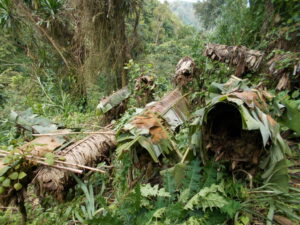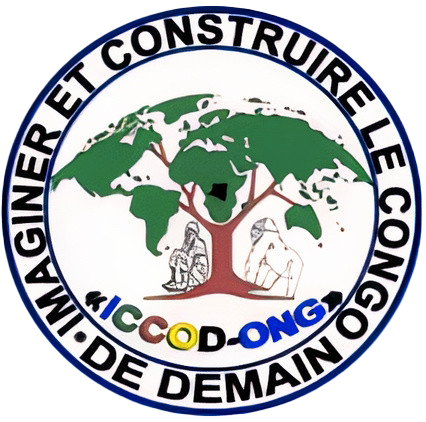ICCOD ONG
IMAGINE
THE FUTURE
OF CONGO
create a better world
Why the Pygmy Peoples need our protection
The Pygmy People Threatened with Extinction in DR Congo
In the debate on the protection of minority peoples throughout the world, we often talk about minority populations coming from outside and established in another country. Unfortunately, the true indigenous and minority people are often forgotten, having already been assimilated by invaders or conquerors. This is the case of the Pygmy people in the Democratic Republic of Congo (DR Congo), who risk seeing their culture become extinct.
The pygmies: the first occupants of the DR Congo
The history of the country, as it is known by ethnologists and historians, demonstrates that we, the pygmies, are the first occupants of the DR Congo. We are the original Congolese, born from Congolese territory according to divine creation. No historian has ever proven another origin of the pygmies, apart from the region of the Central Basin of Africa, mainly in DR Congo. Thus, DR Congo has always been the country of pygmies.
The Pygmies: Guardians of nature and their culture in harmony with nature
In this same story, we discover that the pygmies had a culture that prospered thanks to a generous nature. They did not destroy the environment, but protected it, because their survival depended on it. They watched over the fauna and flora, living by collecting and hunting small game, as well as gathering, like the Garden of Eden. Unfortunately, these people were invaded by the Bantu and other peoples from outside, in addition to the Bantu, and were forced to leave their favorable habitat. They were driven from the equatorial forest to the provinces of DR Congo where they lived by hunting and gathering, but in inhumane conditions, exposed to the dangers of the rainy climate, diseases transmitted by flies and mosquitoes, as well as only cold.
Current challenges and consequences of wars
With the creation of National Parks, the pygmies were chased out of the forests which had become protected areas and were reduced to begging around these parks. They are discriminated against, marginalized and neglected in all aspects of the country’s public life. The wars of aggression which have shaken the country since 1996 have seriously undermined the rights of indigenous Pygmy peoples, particularly in the provinces of South Kivu, North Kivu and Ituri, notably in the territories of Kabare, Kalehe, Masisi, Nyiragongo and Rutchuru. They are deprived of land rights, the right to life, health, education and work. Families live in precariousness, desperately looking for something to eat. They have no cultivable land and are content to beg or steal from the Bantu fields. They are deprived of housing and clothing. Pygmy women face difficult childbirths and many of them die giving birth. The rare children who are born are often victims of malnutrition and lack of breastfeeding. Women, men and children are dressed sparsely, wearing only fiber pasties.
The neglect and abandonment of the authorities
Despite the United Nations Declaration on the Rights of Indigenous Peoples, which affirms that these peoples are equal to all others, the pygmies of DR Congo continue to be neglected and ignored by the government. We therefore request the intervention of the United Nations to put pressure on our government so that it takes us into consideration and grants us territory on our ancestral lands. DR Congo still has nearly 80% virgin forests, while local laws declare that the land and subsoil belong to the state. Unfortunately, the State fails to ensure the stability and settlement of our Pygmy people, who are the first refugees or displaced within their own country.

The current situation and the call for help
The pygmies are victims of attacks from all sides and live in constant displacement. Despite the presence of numerous humanitarian NGOs in DR Congo, none of them take care of the pygmy camps. Aid is distributed to displaced people who have means, while pygmies are stigmatized and excluded. Wherever there are displaced people, pygmies are present, but when it comes to distributing food and aid, it is the Bantu people who benefit thanks to bond systems.
The struggle for survival and integration
Faced with this neglect and abandonment, ICCOD-ONG, a local national organization initiated by Pygmy children and other members of the community, is committed to providing social and economic support to our people. This organization coordinates all activities related to our psycho-social integration, because we are a long-traumatized people who seek to rebuild themselves. The ICCOD-ONG intervenes in all areas of life and development, such as the protection of the environment and ecology, human rights, agro-pastoralism, fishing, beekeeping , protection of children in times of war, education, health, nutrition, pacification and mediation in conflicts.
Find out more about our activities

Support Beekeeping and Nature Protection
Finally, the worrying situation of the Pygmy community, whose survival depends on nature, underlines the urgency of the situation. The Pygmies are calling for international solidarity, asking for support from international organizations, foundations, donors, and associations to preserve their way of life and revitalize their environment.
In conclusion, the protection of bees and nature is a responsibility shared by all humanity. Everyone must realize the crucial importance of these creatures and the need to preserve our environment for the good of our entire planet.
Literacy Program: Empowering Pygmy Men and Women through Education
Our literacy program focuses on empowering Pygmy men and women through education. Recognizing the importance of literacy in enabling individuals to access opportunities and make informed decisions, we provide literacy classes specifically tailored to Pygmy men and women. This program aims to enhance their reading, writing, and numeracy skills, enabling them to participate actively in their communities and improve their overall well-being. Through education, we empower Pygmy men and women to unlock their potential and contribute to their own success and development.
Empowering Pygmy Women for Financial Independence through Income-Generating Activities
In collaboration with Pygmy women, we embark on income-generating activities aimed at overcoming economic challenges despite limited resources. By providing training and support, we enable Pygmy women to engage in income-generating ventures tailored to their skills and abilities. These activities could include handicraft production, small-scale agriculture, or entrepreneurship. By promoting financial independence, we empower Pygmy women to break the cycle of poverty and create a brighter future for themselves and their families.
Green Initiatives: Enhancing Village Communities through Plant Distribution
Through our green initiatives, we focus on distributing plants to village communities. By providing a variety of plants, we contribute to environmental preservation and assist communities in establishing sustainable practices. These plants not only beautify the surroundings but also provide numerous benefits such as improved air quality, food sources, and erosion control. Our aim is to empower local communities to take an active role in environmental conservation for a greener and healthier future.
Restoring Hazardous Areas: Promoting Safety and Sustainability for Local Communities
In this project, we strive to restore and rehabilitate areas that pose dangers to the local community. Our dedicated team identifies and addresses hazardous sites, such as abandoned mines or polluted environments, implementing measures to ensure the health and safety of community members. By mitigating potential risks and restoring these areas, we create a sustainable environment for the community to thrive.

Empowering Pygmy Children Through Education
ICCOD-ONG works ardently to protect the Pygmy people by securing their land rights and preserving their traditional way of life. Through awareness-raising initiatives, support for local development, protection of vulnerable people and international cooperation, ICCOD-NGO fights poverty.
ICCOD intervenes by offering its support for the civil registration of children, even after the legal deadline, in order to respond to the challenges encountered by pygmies and disadvantaged families in terms of registration, due to financial constraints and limited awareness, thus highlighting the crucial importance of this approach.
